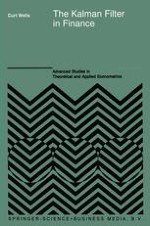1996 | OriginalPaper | Buchkapitel
The Kalman filter
verfasst von : Curt Wells
Erschienen in: The Kalman Filter in Finance
Verlag: Springer Netherlands
Enthalten in: Professional Book Archive
Aktivieren Sie unsere intelligente Suche, um passende Fachinhalte oder Patente zu finden.
Wählen Sie Textabschnitte aus um mit Künstlicher Intelligenz passenden Patente zu finden. powered by
Markieren Sie Textabschnitte, um KI-gestützt weitere passende Inhalte zu finden. powered by
The second topic covered in this book will be the Kalman filter. As an analytical tool, it has been around since the early 1960’s when Kalman introduced the method as a different approach to statistical prediction and filtering. The problem addressed is that of estimating the state of a noisy system. For example, consider monitoring the position and the speed of an orbiting vehicle. Rather well known physical laws may be used to describe the system, but at any give moment of time, the exact position and speed of the vehicle may vary from that predicted by the model as there are always external forces at work that result in random impulses to the system. Again, consider the optimal control of an economic system which is described by estimated equations rather than exact physical laws. There will of course be a difference between the theoretical or estimated output from the model and the actual value of the economic variable due to the errors inherent in the model. To be more precise, consider estimating the marginal propensity to save (mps) out of disposable income. While it is possible to find a trend or steady state value for the mps, its actual value any given year may well deviate from this trend value. In both instances, a well defined concept may not be able to be observed exactly due to the random inputs into the system. Finally, consider the rather simple problem of estimating the time—varying mean of a stochastic system. The mean is assumed to follow a random walk which may or may not contain a deterministic parts. From historical data, an estimate of the mean at the current time is readily available. This estimate may be improved as additional observations of the process become available. Common to all four situations is the that the exact value of the variable studied is not observable and must be estimated.
